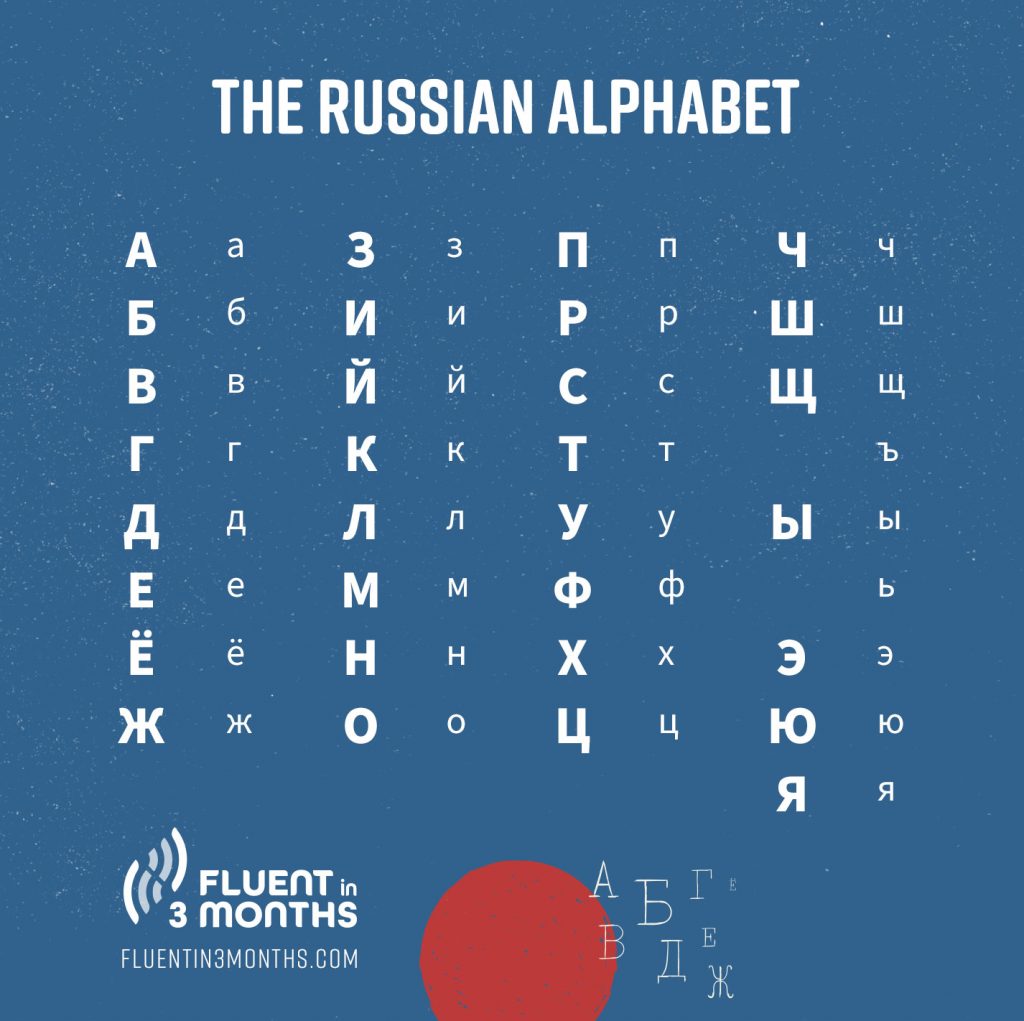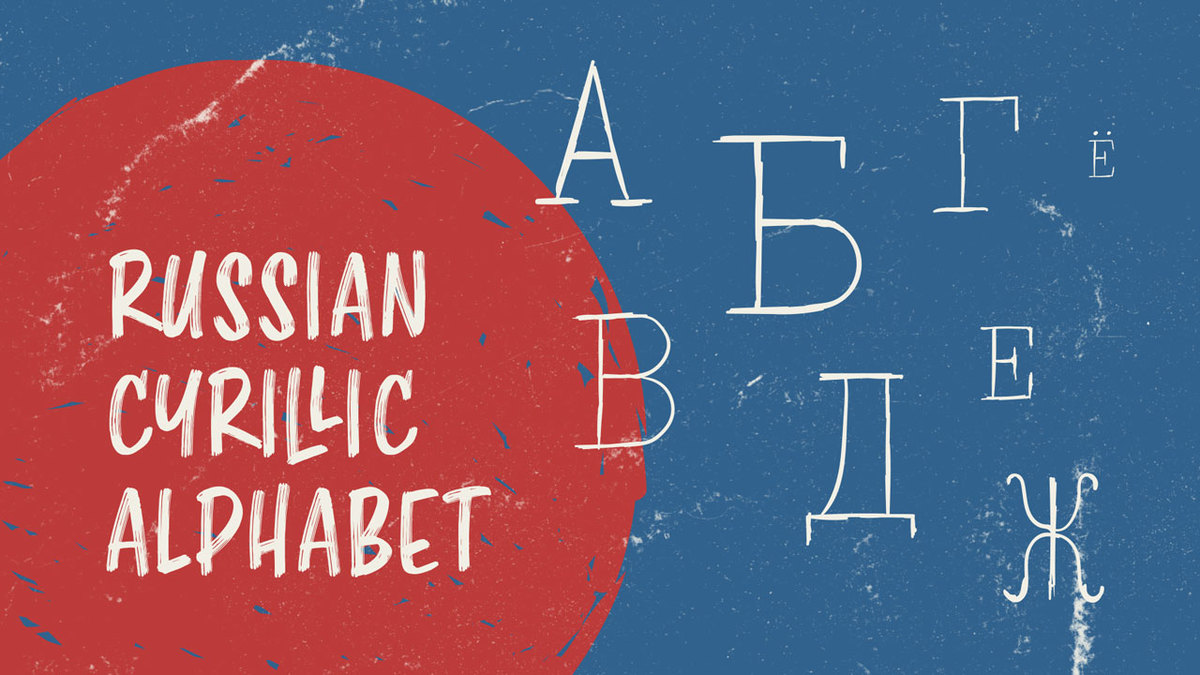Learn the Russian Alphabet: How to Quickly Master the Cyrillic Alphabet
If you use the right approach, you can learn the Russian alphabet in a few hours!
When somebody asked me what my major at university was and I told them that I studied Spanish and Russian, they often replied “What? Russian? Isn’t that difficult? They (the Russians) write differently!”
There are some tricky things about Russian, but the alphabet, a.k.a Cyrillic script, is definitely not the hardest part of the language.
But it’s the first difference to our own language we come across when we get in contact with this language. And since the script is (somewhat) unknown to us, it gives us the impression that Russian is difficult.
But once we get familiar with the unknown script and get over this first barrier, we can dive into the language and enjoy it like every other language.
In this post, I want to give you some advice about how you can easily tackle this barrier and get familiar with the Cyrillic script.
How do I learn the Russian Cyrillic alphabet?
- Is It Important to Learn the Russian Alphabet (A.K.A. Cyrillic Script)?
- Get in the Right Mindset: It’s All About the Letters
- Play With Your Detective Skills by Decoding Words
- Don’t Ignore the Importance of Reading & Listening
- Your Language Exchange Partner Can Help You
- Let Go of the Fear and Use the Russian Keyboard
- How Long Does It Take to Learn the Russian Alphabet/Cyrillic Script?
By the way, you don’t need to speak Russian to make use of these tips!
Is It Important to Learn the Russian Alphabet (A.K.A. Cyrillic Script)?

This question always comes up when a language is written in a script other than the Latin one.
Of course, learning the script is an extra effort. Everybody needs to decide if it’s necessary to make this effort to reach their personal goals.
In my opinion, it’s important to learn Cyrillic script when you learn Russian (or any other language using this script).
Even if you only focus on speaking, the script could still be important to you. For example, there are some phrasebooks available that provide a transcription for all words and phrases, of course, and you could learn from these.
But when you are serious about Russian, I guess it will be very difficult to avoid the script completely.
Most dictionaries or grammar books don’t offer a transcription and I don’t know any Russian publications that use the Latin script instead of Cyrillic.
Also, if you plan to visit Russia as a traveler, it could be very helpful to know how to read the script.
Even in the big cities, you often find Cyrillic street signs only. When I was in Moscow in 2013, I met many travelers at a hostel who complained that the underground stations are written in Cyrillic only.
Many of them regretted that they hadn’t learned a bit of the script because Moscow is an international city. They feared that the “script situation” might get worse once they travel to smaller towns.
So even if you don’t plan to learn Russian itself, I highly recommend getting familiar with the Cyrillic script if you plan a trip to Russia. All you need is a rainy weekend and a positive mood!
Get in the Right Mindset: It’s All About the Letters
The Russian Cyrillic alphabet comprises 33 letters – that’s 7 more than the Latin alphabet.
Many of these 33 letters look very familiar to what English speakers are used to:
A – E – K – M – O – T .
These letters look like their Latin equivalents and have exactly the same meaning. Therefore you are already able to read words like мама or томат.
However, there are a few letters that look like Latin letters but have a different meaning.
В – Н – Р – С – У – Х
For example, the word нос looks very familiar to us and we are tempted to read hoc. But the letters here actually signify nos, which means nose.
I would say that these are the six trickiest letters in the Russian alphabet because we associate a different sound with them.
But this shouldn’t discourage you. After a few exercises, you will get used to reading them correctly.
The remaining letters are alien to most of us:
Б – Г – Д – И – Й – Л – П – Ф – Ц
Ж – З – Ч – Ш – Щ – Ё – Ы – Э – Ю – Я
Ъ – ь
Just because the letters look different doesn’t imply that the meaning behind them is different. Most of them represent sounds for which we either have a letter in the Latin alphabet itself or at least use the sound in our phonetic system. For example, ю represents the sound of you.
You might wonder now, How do I memorize these new Russian letters?
In my opinion, it’s enough to practise intensively for a short period of time, then continuously focus on reading while studying.
It’s like learning the Latin alphabet back at school. At the beginning it takes you about 20 seconds to read a word, later on you will be able to read it at first sight.
However, many people like to work with mnemonics.
You can find several ones others have found useful on Memrise for instance, although I personally prefer to come up with my own memory hacks.
Now it’s time to practise!
Play With Your Detective Skills by Decoding Words
Do you like crosswords or other kinds of puzzles? Then you will love this method. No one said you couldn’t use fun to learn the Russian alphabet.
Get some words written in Cyrillic and try and decode them letter by letter. This exercise is a lot of fun when you work with words whose meaning you will know once you decode them.
For example: go to the Wikipedia article about the cities and towns of Russia by population and you will find a list of the biggest Russian cities in both English and Russian.
Cover the English column (maybe print out the list before) and try to decode the Russian cities. Then you can easily compare it with the “solution”.
(And you don’t only practise reading, you also learn something about Russia.)
Or use the Russian article about the Oscar-winners. You can then try and decode the names of the famous actors. Sometimes, it’s really funny how a famous name looks when written in Cyrillic.
You can work with any article. If you find it difficult to find Russian articles, simply open up a Wikipedia article in English and switch to the Russian version (which you can find in the left navigation column).
Don’t Ignore the Importance of Reading & Listening
It’s easier for us to retain things that we read AND hear. So when we hear a word or a text while we read it, it’s easier for us to remember.
You can find hundreds of thousands of words pronounced by native speakers on Forvo. By comparing the word and the audio file you can get a better feeling for how each letter sounds.
You don’t need to know how to type in Cyrillic at this point.
You can easily copy the words you worked with from your decoding list. Or enter an English word into Google translator or any other online dictionary and copy the Russian translation. You could also work with frequency lists.
If you want to work with random words, Forvo also offers a nice tool. When listening to a word, check out the bottom of the article. At the lower left corner, there is a small line that suggests a random word in the language you are currently listening to.
Your Language Exchange Partner Can Help You
If you have a language partner who speaks Russian, they can help you learn the Russian alphabet in many ways.
For example, they could type easy words into the Skype chat and you try to read them aloud. It’s easier when you work with international names, like famous singers. But you could also work with real Russian words that are appropriate for your learning level.
After you read out the word, your partner can provide you with the English translation. This way, you not only improve your reading skills but also make progress in the language.
Your language exchange partner could also send some sentences or even short texts in Cyrillic via the chat function. The clue: the text is in English but transcribed into Cyrillic.
This is more motivating than actually writing Russian sentences because you can be sure that you understand the meaning of the sentence once you read it out correctly.
But, of course, you could also work with real Russian sentences or texts. You can read them out loud and your language exchange partner can correct you if you read out any letters incorrectly. Just make sure that you don’t worry too much about understanding the text at this point.
And if you don’t have a language exchange partner, you can find a great online language tutor who can help you in the same way!
Let Go of the Fear and Use the Russian Keyboard
As we have practised reading, the next step would be writing.
There are some discussions on various language learning platforms about whether it’s necessary to learn the handwriting of a language. The point is that we mostly use computers or other devices for writing.
It’s a legitimate question, and I guess it depends on your personal goals and your attitude. I, for example, like to work with pen and paper, so I often use handwriting.
So although I think the usefulness of learning handwriting can be debated, I find it crucial to learn how to TYPE the Cyrillic alphabet. It’s not very difficult, and it saves you a lot of time when you want to look up words or send an email to a friend.
There are some software solutions out there that make typing in Cyrillic really easy. I’ve never used one of them because, to me, the most natural way is simply using the regular keyboard and switching languages.
Yes, it might take you a couple of hours to get familiar with the arrangement of the keys. And, at the beginning, you will type slower. But eventually it pays off. You don’t rely on any software and you can use any computer.
Then find a picture of the ‘Russian keyboard’ on the internet and you can see the arrangement of the keys. Now, you can start typing in Russian.
At the beginning it feels a bit awkward and might feel a bit like the first IT-lessons in school (for those of who are older than 25…) when our teachers taught us how to type. But you will get faster and faster.
If you are more tech-savvy, I’d suggest going to Keybr.com, clicking settings, changing the layout to Russian, and practising away!
How Long Does It Take to Learn the Russian Alphabet/Cyrillic Script?
I would say it takes you a few hours to get started with the script. The rest is continuous practise that will happen naturally when you study the language.
If you have a free afternoon or a weekend, grab a big cup of tea (or maybe even some Russian sweets) and just do it.
Once you get started with the exercises, you will see the progress really soon. I promise!
Maybe even ask a friend to join you. Everybody can learn the alphabet, even if they don’t learn the language itself. And it can be really nice and funny to share the struggle of reading and writing like a six-year old school kid.
Don’t forget to share this article with them! 🙂
Original article by Daniela Maizner, updated by the Fluent in 3 Months team.



Social